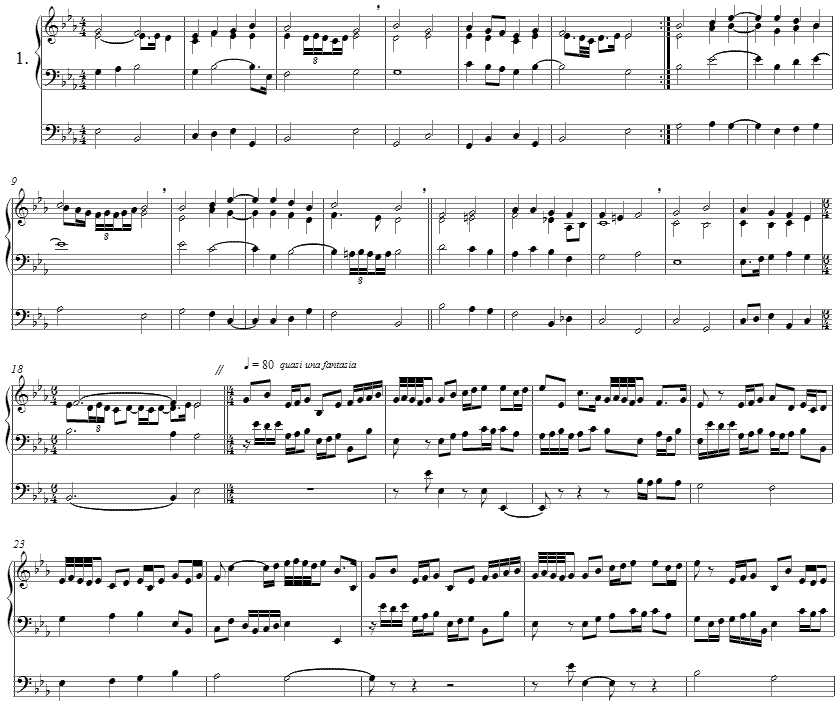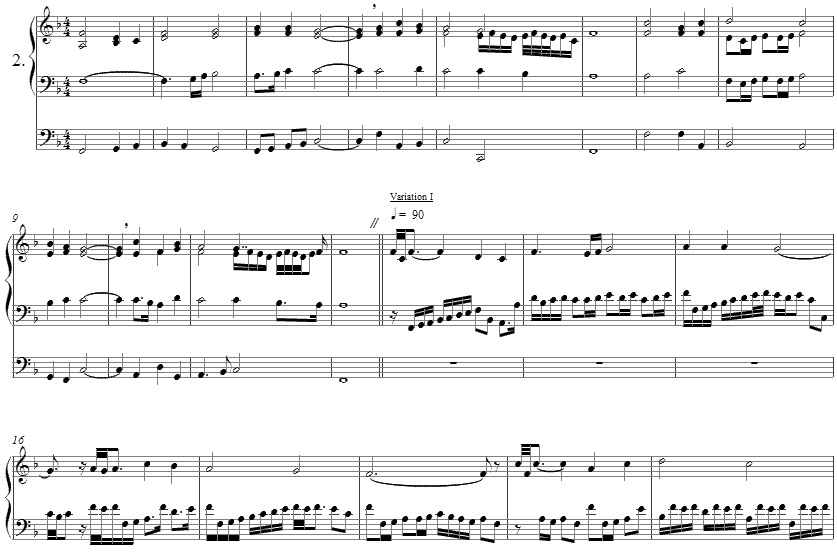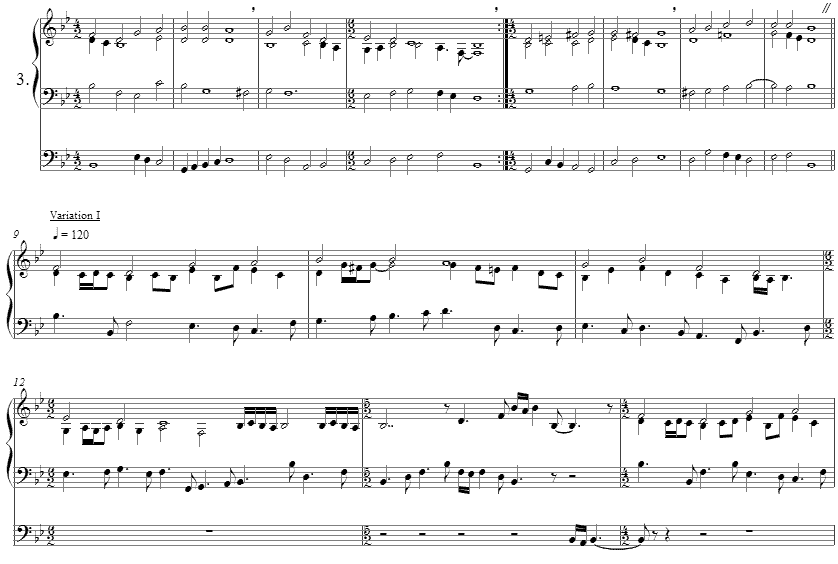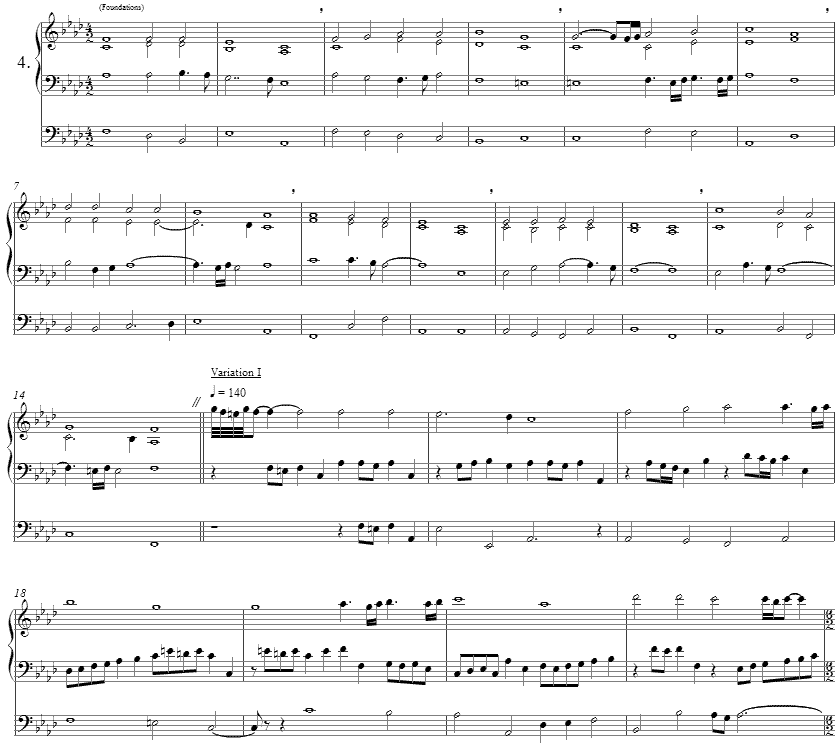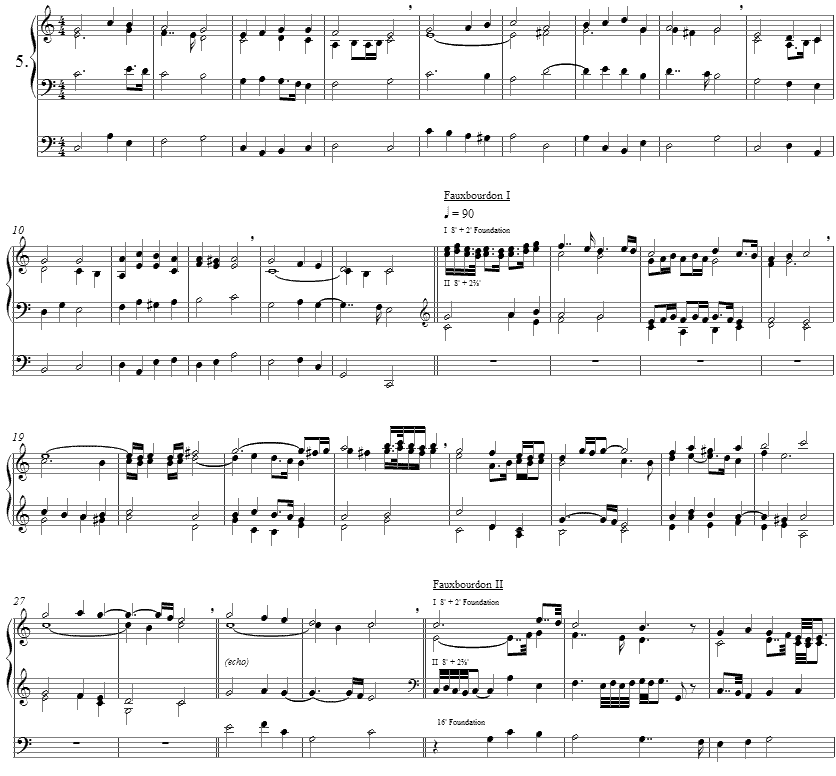Music and Texts of GARY BACHLUND
Vocal Music | Piano | Organ | Chamber Music | Orchestral | Articles and Commentary | Poems and Stories | Miscellany | FAQs
Five Chorale Variations - (on Hymn Tunes of Johannes Crüger) - (2002)
for organ
for Dr. Dorothea Glatt
i. Chorale Variation on "Schmücke dich, O liebe Seele" [ 6 pages, circa 5' 15" ]
ii. Chorale Variations on "Gräfenberg" [ 4 pages, circa 3' 40" ]
iii. Chorale Variations on "Luise" [ 6 pages, circa 4' 30" ]
iv. Chorale Variations on "Herzliebster Jesu, was hast Du verbrochen" [ 8 pages, circa 6' 15" ]
v. Chorale Variations on "Lobet den Herren" [ 4 pages, 4' 40" ]
[ 28 pages - circa 24' 20" ]
Johannes Crüger
Johannes Crüger (1598-1663) was a composer and theorist noted for his compilations and arrangements of several important choral collections, the best-known being Praxis pietatis melica (1647). He contributed many original chorale melodies to these collections, including Jesu, meine Freude; Nun danket alle Gott; Herzliebster Jesu, was hast du verbrochen; and other well-known chorales, also well known for harmonization and chorale variations to his melodies composed by other many composers, most notably Johann Sebastian Bach. Crüger's influential theoretical works were Synopsis musica (1630 and enlarged 1654), Quaestiones musicae practicae (1650) and Musicae Practicae Praecepta (1660). From 1622 until his death he held the post of Kantor at the Nikolai Church, in the center of Berlin, which I have visited on many occasions.
The overall style of these chorale variations is decidedly and unapologetically neo-Baroque, as contrapuntal writing is the best and idiomatic language of this "king of instruments," and as the Crüger melodies and their harmonization by the master, Bach, suggest it.
i. Chorale Variation on "Schmücke dich, O liebe Seele"
After the opening statement of the hymn, this set of variations is marked "like a fantasy," in which the theme is restated in the pedal.
Demo excerpt from measure 19 through 30. MP3 file [ 606 KB, 38" ]
ii. Chorale Variations on "Gräfenberg"
The first of the variations, following the hymn tune, is a simple two-part invention. The next is a trio texture, as the variations become successively more complex.
Demo excerpt from measure 13 through measure 27. MP3 file [ 674 KB, 43" ]
iii. Chorale Variations on "Luise"
This set of variations is textured like a trio sonata, the first variation featuring a dotted rhythm bass line and some ornamentation.
Demo excerpt from measure 9 through measure 20. MP3 File [ 726 KB, 46" ]
iv. Chorale Variations on "Herzliebster Jesu, was hast Du verbrochen"
As with the other chorale variations in this set, this well known hymn begin in the J. S. Bach harmonization with some small ornamentation, following which five variations from simple to complex and fantasia-like follow, each building upon the previous variation.
Demo excerpt begins with the chorale, through to measure 20. MP3 file [ 1.23 MB, 1' 18" ]
v. Chorale Variations on "Lobet den Herren"
Historically, fauxbourdon - which was also known as false bass and faburden - is thought of as a musical texture prevalent during the late Middle Ages and early Renaissance. In the 16th century, some English keyboard music was based on a cantus firmus called "faburden of the chant," consisting not of the original plainchant but of its transposition to a lower pitch, as in the second voice of a fauxbourdon. In that sense, these variations bury the hymn tune into the harmonic texture, or place them in unusual position in the chord progressions.
Demo excerpt, measure 15 through 35. MP3 file [ 820 KB, 58" ]
Dorothea Glatt
For decades, Dr. Dorothea Glatt served as an assistant to Wolfgang Wagner, the director of the Bayreuth Festival. A Wagner expert, she judged international competitions in Japan, Germany, Italy, and the United States. Glatt directed operas in Ireland, served as a consultant to Canadian Opera and National Opera (Greece), and been a dramaturge at Frankfurt Opera. She served as a consultant to Canadian Opera and Royal Swedish Opera. I had learned that she was a "preacher's kid," and so contrived to compose these chorale variations in appreciation of some recommendations she had made in my behalf.
The score for Five Chorale Variations is available as a free PDF download, though any major commercial performance or recording of the work is prohibited without prior arrangement with the composer. Click on the graphic below for this organ score.

